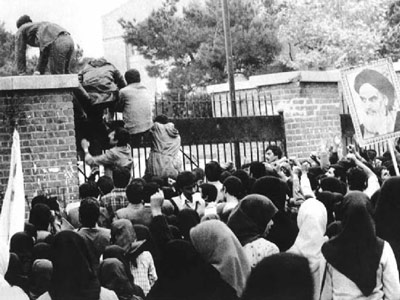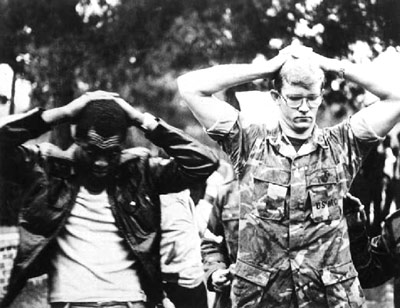The Iran Dilemma

Ahmadinejad reportedly played a role in the kidnapping of hostages from the U.S. embassy in Tehran in 1979.
Ironically, although Iran may have temporarily diverted attention from its refusal to comply with nuclear inspections by aiding Hezbollah's attack on Israel, the overall increasing level of violence in the Middle East is building more support for a U.S. or NATO strike against it. War against Israel is inevitably accompanied by attacks on American citizens. In addition to saying that the Holocaust never happened and that Israel should be "wiped off the map," President Mahmoud Ahmadinejad has threatened the U.S., saying that the U.S. should be "tried as war criminals in courts." Ahmadinejad reportedly played a role in the kidnapping of hostages from the U.S. embassy in Tehran in 1979.

Critics of the Bush administration who complain that the U.S. is too hawkish toward Iran have no better plan of their own to offer. Many would continue to do nothing, even as violence escalates, deferring to the U.N. and its agencies to negotiate with Iran. The U.N. has a poor record of stopping tyrants. Member countries of the U.N. have different priorities than the U.S. Other countries aren't on Ahmadinejad's top two enemies list, and as we learned in the past from France, Germany, and Russia's vote against the 2003 Iraq War, are more concerned about access to cheap oil than whether someone is plotting to drop nuclear bombs on Israel or the U.S.
Ahmadinejad very likely detests the U.S. more than any other country except for Israel. Fortunately, because of the U.S.'s strong position, distant proximity, and lack of offensive aggression towards its enemies, it has been able to avoid the prevalent violence Iran engages in with neighboring ethnic minorities in Turkey, Iraq, and Azerbijan.
It is short-sighted to do nothing except issue toothless warnings from the U.N., permitting an unstable and extremist dictator to continue enriching uranium that everyone knows is only meant for one thing, to build nuclear weapons intended for its enemies - which could include possible use against the U.S. and Israel. Speculation that Iran is enriching uranium for nuclear energy purposes is naïve at best, underhanded at worst. If that were true, Iran would have properly reported its progress to the International Atomic Energy Agency.
Accusations that the U.S. is planning an aggressive "neocon" strike against Iran are misplaced. There is a difference between planning a preemptive nuclear strike, and preparing a contingency plan ahead of time in case a nuclear strike becomes necessary. Pacifists and critics of the Bush administration conveniently like to confuse the two in order to mislead the public. The Bush administration has already capitulated considerably to world opinion and criticism from the pacifist left by agreeing to negotiate directly with Iran for the first time in over 26 years. It makes no sense that the Bush administration would agree to these talks if it was planning a strike. The administration is going to utmost lengths in order to forestall military action.
Bush has learned from Iraq that there is no such thing as a guaranteed quick and cheap intervention. The risk of resulting political and economic damage may not be worth the gamble of a military strike. Republicans cannot afford another mire requiring additional troops while still engaged in Iraq; it would lower morale even further. Gas prices would skyrocket, since Iran has vowed to reduce or cut its oil supply if the U.S. strikes. Although the U.S. does not purchase oil from Iran, the countries that do purchase Iranian oil would be forced to buy oil elsewhere, decreasing the amount of oil available to the U.S., which drives the price up. Intelligence sources recently revealed that Iran has been moving its enrichment programs into urban areas, further reducing the possibility of a U.S. strike.
Instead, the Bush administration is prudently taking the middle ground, preparing for the possibility of a military strike while exhausting all realistic negotiating efforts. The U.S. should continue its tough stance, avoiding full recognition of Iran while continuing to freeze its assets and level economic sanctions against it. The U.S. should avoid any region-wide weapons freeze that would affect Israel. Although some claim the U.S. is being hypocritical since it has thousands of nuclear warheads, terrorists and terrorist groups such as Hezbollah, Hamas and al Qaeda have never abided by international agreements and treaties, so there is no reason to trust them to abide by a regional weapons freeze. The freeze would essentially hand Israel over to terrorists. The U.S. and Israel need nuclear weapons in order to defend themselves and deter despots, which is considerably different than obtaining them to commit terrorist attacks. Ceding ground to an aggressor as unpredictable as Ahmadinejad would likely result in him asking for more.
In a recent column, George Will accused Condoleeza Rice of harboring the naïve belief that any violent activity in Iran signifies progress. This mischaracterization of Rice's position takes the easy way out of a legitimate debate regarding the extent the U.S. should care about what happens in Iran. Rice would not approve of violent activity by hardliners in the former USSR seeking to communize Iran. Nor would Rice look favorably upon a fascist dictator who sought control over Iran's oil (let's not forget Kuwait).
There is only one viable solution. Iran must agree to a Middle East peace process, and cease its support of violent opposition to such a plan. Unless something radically changes the situation in Iraq, U.S. troops are on schedule to withdraw within the next couple of years. Although cynics claim the U.S. cannot "force" a democracy on an undemocratic country, protesting that the U.S. will be engaged in Iraq for many years to come, history has proven otherwise, most notably in this century with Japan. Absent no other significant active U.S. engagement around the world, the possibility of targeted strikes against Iran may become a reality.
Rachel Alexander

Ist praktizierende Anwältin für die Regierung in Phönix im U.S. Staat Arizona. Als ehemaliges Redaktionsmitglied und Kolumnistin des Arizona Daily Wildcat, gewann sie für ihre journalistischen Arbeiten drei Auszeichnungen und schreibt Kolumnen für IntellectualConservative.com und oraclesyndicate.org
sfux - 10. Aug, 09:32 Article 2665x read
















































